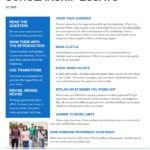Chasing the Story, Not the Debt: My Journey to Uncover Journalism Scholarships
Hey there, future truth-seeker, storyteller, and voice for the unheard!
I remember the feeling like it was yesterday. The thrill of watching a breaking news report, the satisfaction of digging deep into a community issue, the dream of being the one to ask the tough questions. Journalism wasn’t just a career path for me; it was a calling, a burning desire to understand the world and help others understand it too.
But then, reality hit. The price tag for a good journalism education felt like a mountain I could never climb. Tuition fees, living costs, equipment – it all added up to a figure that made my stomach churn. For a while, that financial wall felt like the end of my dream before it even began. I thought, "How can I chase stories if I’m constantly chasing debt?"
Sound familiar? Maybe you’re feeling that same knot of worry right now. Well, let me tell you something important: Don’t give up. Because what I discovered, through a lot of late nights and a fair bit of head-scratching, is that there’s a whole world of support out there for aspiring journalists like us. A world of journalism scholarships that can turn that daunting mountain into a manageable hill.
I’m here to tell you my story, share the lessons I learned, and hopefully, light a path for you. Think of this as your friendly guide to finding the money you need to make your journalism dreams a reality.
Why Scholarships Are More Than Just "Free Money"
When I first started looking into scholarships, I just saw them as a way to avoid student loans. And yes, that’s a huge part of it! But as I went deeper, I realized scholarships offer so much more:
- Peace of Mind: Knowing you have financial support lets you focus on your studies, hone your craft, and really immerse yourself in learning, instead of constantly worrying about bills.
- Validation: Someone believes in your potential! That feeling, that a foundation or organization sees value in your voice and your future contributions, is incredibly empowering.
- Networking Opportunities: Many scholarships come with mentorship programs, invitations to exclusive events, or connections to industry leaders. These aren’t just handouts; they’re doorways.
- Resume Boost: A prestigious scholarship on your resume tells future employers that you’re driven, talented, and recognized by others in the field.
It’s not just about the money; it’s about the entire experience it unlocks.
Where Did I Even Begin Looking? (And Where You Should Too!)
My initial search felt like wandering through a vast, dark forest. "Journalism scholarships" into Google gave me millions of results, and it was overwhelming. But I learned to break it down, to find the clearings.
Here’s where you should start your hunt:
-
Your University’s Financial Aid & Journalism Department: This is often the easiest place to begin. Most schools have specific scholarships for students enrolled in their journalism or communications programs. Ask your department head, your academic advisor, or visit the financial aid office. They often have internal lists or know about local opportunities.
- Keywords to use: "University of [Your School Name] journalism scholarships," "journalism department grants."
-
Professional Journalism Organizations: These groups exist to support the industry and its future. They often have robust scholarship programs. Think big names and niche groups:
- Society of Professional Journalists (SPJ): A fantastic starting point.
- National Association of Black Journalists (NABJ)
- National Association of Hispanic Journalists (NAHJ)
- Asian American Journalists Association (AAJA)
- Native American Journalists Association (NAJA)
- Online News Association (ONA)
- Radio Television Digital News Association (RTDNA)
- Investigative Reporters and Editors (IRE)
- Journalists for Human Rights (JHR) (if you’re interested in international work)
- Keywords to use: "SPJ scholarships," "NABJ student grants," "journalism association funding."
-
Media Companies & Foundations: Many news outlets, publishing houses, and philanthropic foundations understand the importance of a strong, diverse press. They invest in the next generation.
- Look at major newspapers, TV networks, and online news sites. Sometimes they have their own foundations or partnerships.
- Foundations dedicated to specific causes (e.g., environmental reporting, social justice) might also offer journalism-specific awards.
- Keywords to use: "[Major News Outlet] scholarships," "media foundation grants," "journalism fellowships."
-
General Scholarship Databases: Once you’ve exhausted the journalism-specific avenues, broaden your search. Websites like Fastweb, Scholarship.com, and BigFuture allow you to filter by major, interests, background, and more. You might find a general scholarship that still fits your profile!
- Keywords to use: "scholarships for communications majors," "student scholarships."
-
Local Opportunities: Don’t forget your own backyard! Community foundations, local businesses, and even smaller news outlets in your hometown might offer scholarships specifically for local students pursuing higher education, regardless of major. A simple search for "[Your City/County] community scholarships" can yield surprises.
My Big Tip Here: Create a spreadsheet! List the scholarship name, deadline, eligibility requirements, what they need (essay, portfolio, etc.), and a link to the application. This keeps you organized and prevents you from missing deadlines.
Crafting an Application That Actually Gets Noticed (My Secret Sauce)
Finding scholarships is one thing; winning them is another. I learned pretty quickly that sending out generic applications was a waste of time. Every single one needed a personal touch.
Here’s what I poured my heart into, and what I recommend you do too:
-
Your Story is Your Superpower (The Essay/Personal Statement):
- This is not just about listing your achievements. It’s about showing why journalism sets your soul on fire. What sparked your interest? What kind of stories do you want to tell? Why is your voice important?
- Be specific: Instead of "I want to report on important issues," try "I want to use data journalism to uncover systemic inequalities in my community’s housing market, inspired by the struggle my own family faced."
- Be authentic: Don’t try to sound like someone you’re not. Let your passion, your curiosity, and your genuine self shine through. I once wrote about how my grandmother’s storytelling inspired me to seek out untold narratives, and I think that honesty resonated.
- Proofread, proofread, proofread: A sloppy essay screams "I don’t care enough."
-
Show, Don’t Just Tell (Your Portfolio):
- For journalism, this is absolutely key. Even if you’re a beginner, you can start building a portfolio.
- What to include: High school newspaper articles, blog posts you’ve written, short video reports from a class project, photos you’ve taken for a story, even a well-researched opinion piece for a local online forum.
- Quality over quantity: One strong, well-edited piece is better than five rushed ones.
- Show range: If you can, show different types of work – writing, photography, video, audio.
- My experience: I didn’t have a ton of "professional" clips, but I included an article I wrote for my college paper that won a small campus award, a short documentary I shot on my phone for a class, and a detailed research paper on media ethics. It showed my potential.
-
Choose Your Champions (Letters of Recommendation):
- Don’t just ask the first teacher who comes to mind. Ask someone who knows you, who can speak to your work ethic, your curiosity, your writing skills, and your potential as a journalist.
- Give them plenty of notice, and provide them with your resume, a list of your accomplishments, and even a draft of your essay so they can tailor their letter to the specific scholarship.
-
Polish Your Profile (Resume/CV):
- Highlight any relevant experience: school newspaper, yearbook, debate club, volunteer work that involved research or communication, even a part-time job that taught you interviewing skills or attention to detail.
- Keep it clean, concise, and easy to read.
-
Mind the Details:
- Read the instructions carefully: Seriously, this sounds obvious, but so many people miss crucial requirements.
- Meet deadlines: No exceptions. Late is a guaranteed "no."
Don’t Let Common Doubts Trip You Up
When I was in the thick of it, I had so many moments of self-doubt. "I’m not good enough." "It’s too competitive." "Only straight-A students get these."
Let me tell you, those thoughts are liars.
- "It’s too competitive." Yes, some are. But many scholarships are looking for specific qualities – a unique background, an interest in a niche area of journalism, someone from a particular geographic region. Don’t self-reject!
- "I’m not a perfect student." Many scholarships value passion, potential, and real-world experience just as much, if not more, than a perfect GPA. If your grades aren’t stellar, show how your passion for journalism makes up for it.
- "I don’t have enough experience." Everyone starts somewhere. What unique perspective do you bring? What stories are you uniquely positioned to tell? Focus on that.
The key is persistence. You might get a few "no’s." I certainly did. But each "no" was just a step closer to a "yes." Keep applying. Keep refining your applications.
Beyond the Money: The Real Prize
Ultimately, I did win a couple of scholarships that made a huge difference. They eased the financial burden, yes, but they also gave me something more profound: confidence. They affirmed that my dream wasn’t just a pipe dream. They connected me with mentors who guided my early steps. They opened doors to internships I wouldn’t have dared to apply for before.
These scholarships didn’t just pay for my education; they invested in my future as a journalist.
Your Story Starts Now
So, if you’re standing at the crossroads, torn between your passion for journalism and the fear of financial strain, take a deep breath. The path to funding your dream is there. It takes work, it takes patience, and it takes a belief in your own unique story.
Start digging. Start writing. Start connecting. Your voice matters, and there are people and organizations out there ready to help you amplify it.
Go chase those stories. Go make a difference. And remember, the first story you tell might just be your own journey to getting there.
Quick FAQs About Journalism Scholarships (Because I Had These Questions Too!)
-
Q: Do I need to be accepted into a journalism program before applying for scholarships?
- A: Not always! Some scholarships are for high school seniors planning to major in journalism, or even for current college students changing their major. However, many do require you to be accepted or currently enrolled in a specific journalism or communications program. Always check the eligibility requirements carefully.
-
Q: Are there scholarships for specific types of journalism (e.g., photojournalism, investigative journalism)?
- A: Absolutely! Many organizations specialize. For example, the National Press Photographers Association (NPPA) offers photojournalism scholarships, and Investigative Reporters and Editors (IRE) has grants for investigative projects. Be specific in your search!
-
Q: Can international students apply for journalism scholarships in the U.S. (or other countries)?
- A: Yes, many scholarships are open to international students, but it’s crucial to check the specific criteria for each one. Some are country-specific, while others are global. Don’t assume you’re ineligible without checking!
-
Q: What if my grades aren’t perfect? Should I still apply?
- A: Definitely! While some scholarships are merit-based and focus on GPA, many others consider a holistic view of the applicant – passion, experience, leadership, community involvement, and your personal story. Don’t let grades alone deter you.
-
Q: How many scholarships should I apply for?
- A: As many as you realistically can, ensuring each application is high-quality and tailored. It’s a numbers game to some extent, but quality always trumps quantity. Focus on the ones where you truly meet the criteria and feel you can submit a strong application.
-
Q: Is there a "best time" to apply for scholarships?
- A: Scholarship deadlines vary widely throughout the year. Many open in the fall for the following academic year, with deadlines often in late winter or early spring. However, some have rolling deadlines or deadlines at other times. Start looking early – ideally a year before you need the funding!



